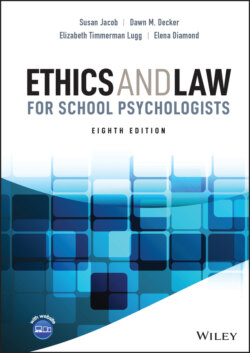Читать книгу Ethics and Law for School Psychologists - Susan Jacob - Страница 39
Honesty and Integrity in Professional Relationships
ОглавлениеA psychologist–client relationship is a fiduciary relationship, that is, one based on trust. To build and maintain trust, school psychologists must demonstrate integrity in professional relationships. The broad principle of integrity encompasses the moral obligations of fidelity, nonmaleficence, and beneficence. Fidelity refers to a continuing faithfulness to the truth and to one’s professional duties (Bersoff & Koeppl, 1993). Practitioners are obligated to be open and honest in their interactions with others and to adhere to their professional promises (CPA, 2017; APA Principle B; NASP Broad Theme III).
Consistent with the broad theme of honesty and integrity in professional relationships, school psychologists make known their professional priorities. Their top priority is the welfare of children and youth:
The school psychologist’s commitment to protecting the rights and welfare of children and youth is communicated to the school administration, staff, and others as their highest priority in providing services. School psychologists are ethically obligated to speak up for the interests and rights of students and families even when it may be difficult to do so. (NASP Standard III.2.3)
Because they typically provide services to several different groups (e.g., families, teachers, classrooms, students), practitioners may encounter situations in which loyalties are conflicted. For this reason, “as much as possible, school psychologists make known their priorities and commitments in advance to all parties to prevent misunderstandings” (NASP Standard III.2.4).
School psychologists are also forthright about what they have to offer their clients and other recipients of services. They “explain all professional services to clients in a clear, understandable manner,” and are candid about “their roles, assignments, and working relationships with recipients of service and others” (NASP Standard III.2.1). In addition, they establish clear roles for themselves within their work setting while respecting the various roles of colleagues and other professions (NASP Standard III.2.2). Read and consider Case 1.3.
